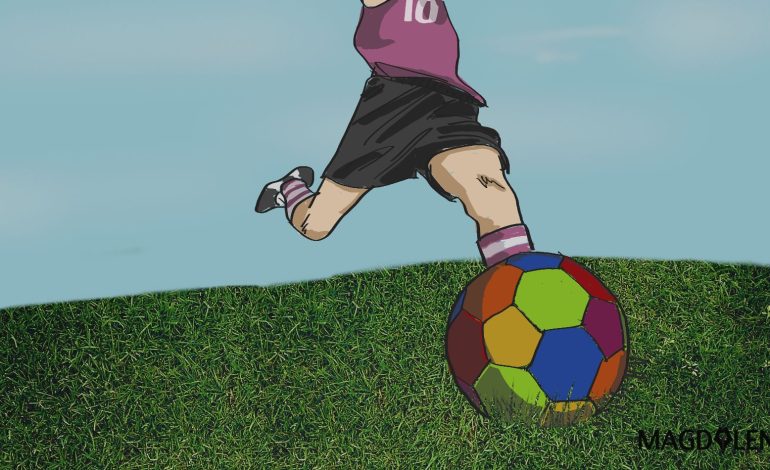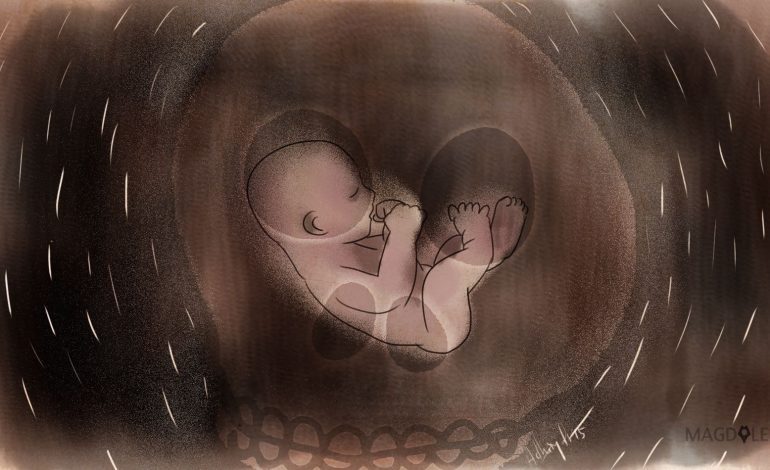Why I’m Crazy About Women’s Football

On my Sweden holiday, I wanted to watch a Damallsvenskan match. Unfortunately, no match took place in Stockholm that weekend, but I was lucky that a free-to-air channel broadcasted the big match of FC Rosengard versus Linkopings FC.
I noticed something peculiar during the match: the corners’ flags were rainbow flags. There was no rainbow flag in the more crowded men’s games. Men’s football involves bigger money and audience, so it can’t afford political controversy, while women’s football proudly lives in the queer world. Erin McLeod, Rosengard’s goalkeeper, is married to her teammate Ella Masar.
My love with women’s football started when I supported United States’ men’s national team in early 1990s. My aunt sent “soccer” magazines from United States, and many articles featured female players and teams.
It is natural for me that women play football the way women also play volleyball, tennis, and badminton, but, unfortunately, for most men (and probably women) it’s not natural. Indonesia is one of many countries that is described as “football crazy” in international news, but it only cares about men’s football.
There were only two references of women’s football in Indonesia in my teenage years – the final scene of Warkop DKI’s Maju Kena Mundur Kena, in which Dono wears disguises to take part in a women’s match, and the media appearances of Mutia Datau, a 1980s’ actress and footballer. To this day mainstream media don’t say anything about global women’s football in the hourly news update of European men’s football.
In fact, we did not send a women’s football team to the 2017 SEA Games, amid all the hypes for junior men’s teams. There are Indonesian girls and women who play futsal and football, but they are omitted as PSSI, media, and sponsors keep looking for the next Indonesian wonder boy. We are joining Iran, Argentina, Uruguay, and Singapore as “football crazy” nations who ignore women’s football. Singapore has no budget excuse, and the three other countries have experience and expertise – for boys and men.
East Asian women’s national teams flourish, despite the entrenched sexism in those nations. Outside East Asia, women’s football grows stronger in societies where men are less interested with machismo. Therefore, North European countries appreciate women’s football better than South European countries, and women’s football is neglected in South America, Africa, and the Middle East.
I am fortunate that in mid and late 2010s, there are more options to watch and follow news on women’s football, although they are still significantly limited. Indovision’s Soccer Channel broadcasted the UEFA Women’s Euro 2017 tournament without studio analysis and newspaper promotion. FIFA video games feature women’s national teams since 2015, but still do not include clubs. Finally, some clubs and federations are generous enough to stream their international matches on YouTube, and clubs like Paris Saint-Germain and FC Barcelona have featured their women’s team and players in their TV shows.
Watching women’s football is a rewarding subculture. Women’s Soccer United is still my primary hub to catch news, get the links to streamed matches, and know the social media accounts of women’s footballers.
Many female footballers are vocal. American midfielder Megan Rapinoe was the first white female athlete to kneel during the “Star Spangled Banner” to protest police’s impunity. English forward Eniola Aluko testified on racist remarks made by the England manager, and Scandinavian and German players support refugees and criticize the far-right in their social media accounts.
When women play football, they challenge the exclusivity of machismo, and so are put down through ignorance, derision, and objectification.
Why women’s football isn’t more popular? The most common answer is “because it isn’t as skilled and exciting as men’s football”, and it’s a rubbish answer. Indonesian men play lousy football, yet the stadiums are still packed week after week. Women’s football isn’t popular because women play it.
Football is one of toxic masculinity’s last refuges. Check the timeline of a man who contradicts a feminist and you’ll find that he’s either a gamer or a football fan. George Orwell called football as “War minus the shooting”. Two Muslim Javanese Jakartans can illogically dislike each other because they support rival English or Spanish clubs, and Europeans inexplicably hate fellow residents of the same city.
When women play football, they challenge this exclusivity of machismo, and so are put down through ignorance, derision, and objectification. Same goes to women participating in men’s football, such as officials, medics, and executives.
Women’s football, like many other sports played by women, struggle with sponsorship and salary. The United States’ professional league folded several times, although the national team is three-times world champion. Norwegian female footballers successfully fought for equal payment this year, while the Danish team was still on strike at the time of writing.
Every time I win the women’s tournament on FIFA and gets a trophy, I feel sad that the trophy is classified as “rare”, probably even “ultra-rare”. It’s not hard to achieve, but less than 5 percent of millions of players bother to play it. Until last year, at the beginning of each match, I also had to deal with the patronizing commentators saying, “women’s football is getting more interesting; the quality is getting closer to the men’s level.” Which men? Why do the two have to be compared at all?
I admit that I like women’s footballers because they are attractive, in the same way many people idolize handsome men’s footballers. But I am also into the sisterhood, the bravery and resolution in fighting for their – and other’s – rights, and in owning up their mistakes.
We are still years away from men’s footballers coming out. We are still years away from men’s footballers showing their support for queer people (supporters have). Luckily, we have got men’s footballers supporting equal pay and income redistribution, but even those are too controversial for some fans.
Women’s football might never be as mainstream as women’s tennis, but, for now, maybe its indie nature helps it being politically progressive and fun to watch. I would like to end this article with a hope for Indonesian women’s football, but when New Zealand’s and Brazilian federations and public still can’t respect women’s footballers, what chance that Indonesia has?
Read Mario’s view on the recent “non-pribumi” controversy and follow @MarioRustan on Twitter.






















